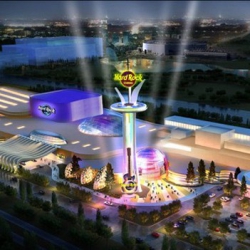
Hard Rock International said in June it would like to build a $1 billion casino next to the Meadowlands Stadium.
New Jersey Senate President Steve Sweeney revealed a plan on Friday to have a state referendum on two land-based casinos outside of Atlantic City. Under details of the plan, New Jersey residents would vote during the U.S. presidential balloting in November 2016 to approve two North Jersey casinos.
The vote would not specify locations for the two casinos. The only stipulation is they would be placed in two separate counties in the northern part of the state, where they would be closer to New York City than the proposed gaming venues approved by New York State in December 2015. If the vote was a success, New Jersey likely would undergo an application process to license those two casinos to gaming developers.
North Jersey Casino Developers
Over the months, a number of casino companies have shown interest in building a North Jersey casino. Hard Rock International and the Meadowlands Racetrack announced a plan in June 2015 for a $1 billion casino development next to the Meadowlands Stadium. Paul Fireman, the footwear executive, has proposed a $5 billion development.
Sheldon Adelson has spoken about the advantages of a casino in the Meadowlands, while New York racetrack owner Jeff Gural has lobbied for such a construction. Caesars Entertainment and Genting Limited, which both failed in their bids for an Orange County, New York casino, are likely to be interested, too.
The bill appears to exclude casino gaming at Monmouth Park in Oceanside, because it proposes a 75-mile non-gaming radius around Atlantic City.
Details of the Plan
Steve Sweeney’s plan does not specify a tax rate, but it earmarks several special interests which would receive a share of those taxes. Atlantic City, which can be expected to lose significant revenue if North Jersey casinos were built, would receive slightly over $1 billion in revenues over a ten-year period from the Sweeney plan. Money also would go to each county to serve as tax relief to disabled residents and senior citizens. Tax revenues also would go to the state’s beleagured horse racing industry.
The plan is expected to be debated at length throughout the year. Atlantic City’s business and political leaders have said their city’s gaming industry would collapse if casinos were built anywhere but the Boardwalk. Since New Jersey casinos first opened in 1978, Atlantic City has enjoyed a casino gaming monopoly in the state. February 2016 is an important date, because that is when Gov. Chris Christie’s announced 5-year moratorium on building outside of Atlantic City ends. In February 2011, Gov. Christie said he wanted to give Atlantic City five years to turn around their casino industry, so he would veto any bill which proposed casino-building outside Atlantic City. The industry has not turned around, so one of Sweeney’s biggest obstacles to his plan is not as likely to stand in the way in November 2016.
Don Guardian on Atlantic City’s Plight
Not everyone agrees with Steve Sweeney. Atlantic City Mayor Don Guardian argues plans like Sweeney’s only cannibalize the market further and undermine decades-long investments in the Boardwalk. Mayor Guardian discusses the closing of four casinos in 2014 and the economic devastation it brought to his area.
He said, “Whole families lost their only source of income after being ‘Day One’ employees at the casinos that they had invested their whole lives in. Auxiliary services that depended on the thriving casinos died a slow death as each casino went dark and no longer needed their service.”
Guardian says the construction of gaming venues elsewhere is going to come at a human cost. He said, “Just about everyone who made a living in Atlantic City and the surrounding areas felt the terrible effects of broken promises from expanded casino gambling and oversaturation of the market.”
In Favor of North Jersey Casino
Proponents of the North Jersey plan argue that the state needs to revitalize the gaming industry by building casinos nearer to the east coast population centers. They argue that the industry saturation over the past two decades has made destination cities like Atlantic City a thing of the past (outside Las Vegas). Those who see casinos in the Meadowlands or Jersey City as the answer appear to believe Atlantic City is no longer a feasible location for large-scale casino gambling.
Steve Sweeney has spoken and written about the need to re-invest the tax revenues from the North Jersey casinos in a transition away from Atlantic City’s dependence on casinos. He would prefer to see that billion dollars used to transform the Boardwalk into a non-gaming tourism destination.
“The Time for Voters to Decide”
Sweeney’s press release on announcing his plan on Friday included a call to action. He believes the time to debate the feasibility is over — that the people of New Jersey need to decide on a plan and execute the plan. Sen. Sweeney said, “The question of gaming outside of Atlantic City has long been debated. Now is the time for the voters to decide.“
